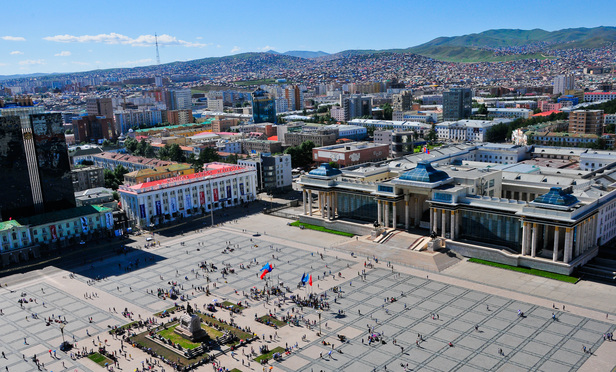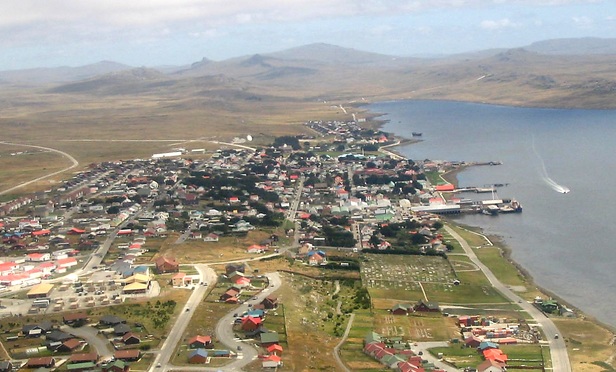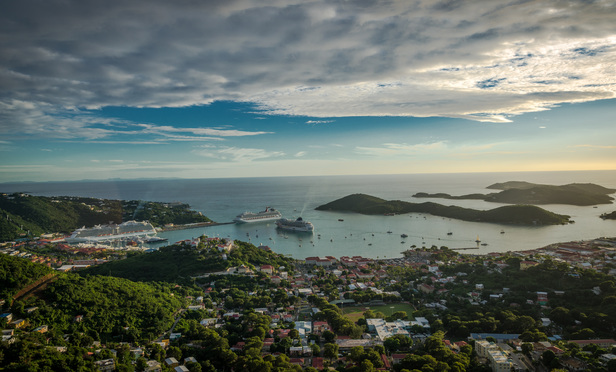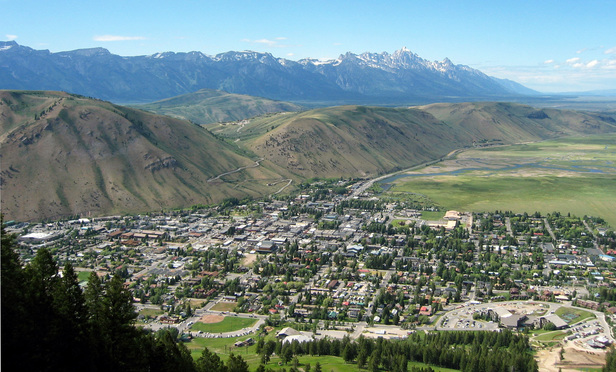Mongolia
Hogan Lovells partner Chris Melville is getting used to the weather in Ulaanbaatar, Mongolia, which can plunge to 40 degrees below.
Melville spent years working for the firm in Moscow, beginning in 1999. He says the legal frontier in Russia was similar to present-day Mongolia. "That was when people were making agreements on just three pages and when I came here, it was not much different than that," says Melville, who arrived in April 2012 – a year after the office opened – and became the office managing partner in 2014. Another English-qualified counsel and six Mongolian lawyers have joined Melville in the lone Am Law 100 office in the country.
While Melville, a native of Scotland, speaks English and a bit of Russian, he does not know Mongolian. His wife, a native of Mongolia who speaks five languages, helps with that. The couple are raising their three-year-old in the nation's capital.
Operating in Mongolia requires a keen understanding of political connections, which can make or break the big infrastructure projects on which the firm advises, Melville says. With Mongolia landlocked between China, a purchaser of much of the country's raw commodities, and Russia, which sells Mongolia much of its electricity, Mongolian projects often become a tightrope walk between the local powers' interests.
"Above a certain level, almost every project will tend to get politicised," Melville says. "So it's very important to get government support for every project you're working on; otherwise there's a chance it might not happen." The firm's presence helps its lawyers gain expertise navigating the politics, Melville says.
The firm has issued legal opinions in Mongolia, mostly for financing large projects. In April, the firm represented the Mongolian government on local law issues concerning its issuance of $500m in sovereign bonds, the country's first bond issuance since 2012.
With an economy reeling from the global drop in commodities prices, the Mongolian government asked the International Monetary Fund for a bailout in September. The country has long-term debt of around $23bn, nearly double its $12bn annual GDP.
But Melville is optimistic that foreign investors from South Korea, Japan and elsewhere will see Mongolia as a land of opportunity. His team has represented Japanese banks that lend to the Mongolian government.
As a partner in Moscow, Melville helped Russian billionaire Mikhail Prokhorov get approval from the National Basketball Association to buy the New Jersey Nets. Basketball is popular in Mongolia but he doesn't see a Mongolian magnate doing the same. "I think the possibility of someone here buying a team like the Nets will be some way off," Melville says. "But there are some guys here with a lot of money, so I wouldn't rule it out."
Myanmar
Baker & McKenzie is a constellation of far-flung offices in 47 countries, often geared toward helping the world's largest companies enter new markets. One of the latest examples is the firm's outpost in Yangon, Myanmar, which opened in February 2014 and is the sole office of a global firm in the country.
Myanmar's fortunes brightened in September when President Barack Obama pledged to lift longstanding sanctions. The move was billed as a reward for the recent election of a democratic government, which represented a turn away from decades of oppressive military rule. A McKinsey Global Institute report says the country could see $100bn in foreign direct investment in the country's agriculture, mining and manufacturing sectors during the next 20 years.
The task of helping clients take advantage of this largely falls to Jo Daniels, an Australian-trained lawyer with a background in infrastructure development. Daniels, who had vacationed in the country long before plans to open the office surfaced, arrived from Melbourne in July and heads the office of four partners and nine associates. She has no plans to leave. "I'm all-in on Myanmar," Daniels says. "I love it here."
She says she's amazed by the pace of change in the country. When the office opened in 2014, cellphone SIM cards cost $150 apiece. They're now $1.50, she says. The country's first ATM was installed in 2013. They're now ubiquitous. On the legal side, the country's legislature has already passed laws concerning foreign investment, companies and arbitration. "We can send client updates every single week," Daniels says.
Daniels is earning a PhD from the University of Melbourne focused on regulating access to infrastructure for companies that didn't invest in building that infrastructure. Opening up railways and ports to more companies can transform an economy, she says. She hopes Myanmar will take that approach.
As for plans for the office, it will continue to grow with mostly local additions. A one-lawyer outpost in a far-flung country? "That's not the Baker & McKenzie way," Daniels says.
Falkland Islands
Pinsent Masons' presence in the Falkland Islands, a 3,000-person semi-autonomous country just east of the southern tip of South America, is a vestige of the UK-Argentina conflict in 1982.
When the UK won control of the territory, the government sought to support the island. So officials called on Scottish lawyer Gavin Farquhar, whose firm had a relationship with an auditing company studying the islands' needs.
Farquhar agreed to set up a Falklands office. He arrived in 1988 and stayed a year. At the time, he was the only lawyer in town other than an attorney general.
In 2006, he was part of a 12-partner Ledingham Chalmers team acquired by McGrigors, which in 2012 was taken over by Pinsents. The UK firm has continued to support the office and it is now staffed full-time by a UK-trained lawyer; Farquhar visits once a year.
Most of the firm's commercial work on the island involves licensing for firms looking to exploit the area's most abundant natural resources: farmland and fisheries. Farquhar hopes that a recent oil discovery near the Falklands will soon give way to oil and gas work, which would blend nicely with Pinsents' energy practice. But oil prices may need to rise for drilling to become economical.
Mainland UK lawyers will sometimes head to the courthouse in Stanley, the capital, to try a case, defending a fishing company accused of breaching fishing regulations, for example.
The firm also handles personal legal matters for the islands, including drafting wills, closing sales of homes and, at times, defending the criminally prosecuted. "All of that stuff you'd see in a high street law firm, you're likely to see our local lawyer doing in the Falklands," Farquhar says.
That led to some anxiety for Farquhar when he first arrived. He was assigned a client accused of escaping custody from the military police. To prepare for his first courtroom appearance, Farquhar spent the night before the trial reading Advocacy For Beginners. He was somewhat surprised when the jury returned a verdict of not guilty.
During his time there, Farquhar has also learned about another vestige of the Falklands War: landmines. While playing golf with a client, Farquhar sliced his drive into an area that warned golfers of landmines left over from battle. His client ignored the sign and Farquhar's pleas to avoid the area – made with his fingers plugging his ears – and headed to retrieve the ball.
"He said, 'I saw them laying the mines, and I know exactly where they put them, so I'll be fine,'" Farquhar says.
US Virgin Islands
Charlie Engeman sailed as a boy at his grandparents' home in St George, New York. He became an elite rower in college, competing in the World University Games in the 1980s.
So maybe it's no wonder he became restless after joining Goodwin Procter as a Boston associate. He quit in 1991, quoting Jimmy Buffett in a departing memo: "There's still time to start a new life in the palm trees."
In December 1992, he moved to the Caribbean. His father William, a former partner at Cincinnati firm Taft Stettinius & Hollister, told him he was making a "career-killing" mistake. "But it turned out to be probably the best move that I could imagine," says Engeman, now the managing partner of Atlanta-based Ogletree Deakins' office in St Thomas in the US Virgin Islands. He opened that office, the firm's first international outpost, in 2000. It now has four lawyers.
Engeman arrived with plans to help a family friend get a 55-foot sailboat in working order. He figured he'd move back to a mainland big firm "once I got the sailing bug out of me". That sailboat never made it out of the pier. His legal career caught wind instead.
Working at what was then St Thomas's largest law firm, with 13 lawyers, Engeman developed a bustling employment practice representing large US companies hit with labour disputes in the Caribbean. He had clients including AT&T, IBM and JP Morgan Chase.
After becoming a partner at the local firm and working there for seven years, he began reaching out to global firms. Ogletree wanted to expand its relationships with companies he represented. "It was the second best move of my professional career," he says. "It allowed me to continue to live and work in the Virgin Islands."
Engeman's practice takes him all over the Virgin Islands. A pilot, he flies his own small plane and isn't tied to airline schedules.
He once represented a South Carolina-based hotel fighting an employment dispute in nearby St Kitts. Engeman scheduled a meeting with the labour commissioner there and flew in to get a key signature the client needed.
"I was back in St Thomas for dinner," he says. "That was not something that another South Carolina firm would be able to do for that company, and it was an incredibly fun day. I got to fly."
Jackson, Wyoming
Joe Teig wears cowboy boots and jeans to work. Elk sometimes block the road to the office. "It's not quite cowboy country, but it's a mountain town," Teig says.
Welcome to life in Jackson, Wyoming. Teig has been at Holland & Hart's office here since 1997. He's the senior lawyer among the 10 in the lone Am Law 200 outpost here, where more than 90% of the county's land is a wildlife refuge.
Besides wide open spaces, Jackson has something else in abundance: money. The town is in Teton County, the most economically uneven county in the US, according to the Economic Policy Institute. The average income of the top 1% there is nearly $20m, more than 233 times what the bottom 99% make. That's the largest intercounty income gap in the US. But here's the crazy part: the bottom 99% make nearly $100,000 a year, on average.
The situation gives Holland & Hart's real estate and wealth management practices access to lots of clients. But it also makes it hard for lawyers to afford to live there.
"I got here just in time about 20 years ago," Teig says. "One of the biggest challenges for us to sustain and grow our practice here in Jackson is the cost of living. And of course, people who work in Silicon Valley and San Francisco laugh at me about that."
The place is a boom town running out of land as more wealthy people flock here, attracted by Wyoming's lack of a state income tax. The median value of a home in Teton County is $675,000. (It's $175,700 nationally.) Teig calls housing a "crisis" in Jackson. Working people can't afford to live there. St John's Medical Center, the local hospital, has bought homes for employees to live in since 2008.
For the firm, the boom in Jackson came when partner Marilyn Kite moved there for personal reasons. She and another lawyer opened the office in 1991. Then Kite was appointed the first woman justice to the Wyoming Supreme Court. "We really wondered whether we could survive in Jackson because she was so important to this office," Teig says.
Now, 16 years later, the office has come full circle. Kite retired from the bench and in August announced she would return to the Jackson office as a counsel. And with all the billionaires moving to town, the firm is considering adding to its wealth management practice.
"A lot of those clients have lawyers on the east coast or west coast, but they really want to have their lawyer here in Jackson, and I think that's something we'll see opportunities for as this office continues to grow," Teig says.
This content has been archived. It is available through our partners, LexisNexis® and Bloomberg Law.
To view this content, please continue to their sites.
Not a Lexis Subscriber?
Subscribe Now
Not a Bloomberg Law Subscriber?
Subscribe Now
NOT FOR REPRINT
© 2025 ALM Global, LLC, All Rights Reserved. Request academic re-use from www.copyright.com. All other uses, submit a request to [email protected]. For more information visit Asset & Logo Licensing.
You Might Like
View All

Some Elite Law Firms Are Growing Equity Partner Ranks Faster Than Others
4 minute read
KPMG's Bid To Practice Law in US On Hold As Arizona Court Exercises Caution
Trending Stories
- 1Eight Years On, A&O Shearman’s Fuse Legal Tech Incubator is Still Evolving
- 2Google Makes Appeal to Overturn Jury Verdict Branding the Play Store as an Illegal Monopoly
- 3First Amendment Litigator Returns to Gibson Dunn
- 4In Record Year for Baker Botts, Revenue Up 11.8%, PEP Up 17.6%
- 5Loopholes, DNA Collection and Tech: Does Your Consent as a User of a Genealogy Website Override Another Person’s Fourth Amendment Right?
Who Got The Work
J. Brugh Lower of Gibbons has entered an appearance for industrial equipment supplier Devco Corporation in a pending trademark infringement lawsuit. The suit, accusing the defendant of selling knock-off Graco products, was filed Dec. 18 in New Jersey District Court by Rivkin Radler on behalf of Graco Inc. and Graco Minnesota. The case, assigned to U.S. District Judge Zahid N. Quraishi, is 3:24-cv-11294, Graco Inc. et al v. Devco Corporation.
Who Got The Work
Rebecca Maller-Stein and Kent A. Yalowitz of Arnold & Porter Kaye Scholer have entered their appearances for Hanaco Venture Capital and its executives, Lior Prosor and David Frankel, in a pending securities lawsuit. The action, filed on Dec. 24 in New York Southern District Court by Zell, Aron & Co. on behalf of Goldeneye Advisors, accuses the defendants of negligently and fraudulently managing the plaintiff's $1 million investment. The case, assigned to U.S. District Judge Vernon S. Broderick, is 1:24-cv-09918, Goldeneye Advisors, LLC v. Hanaco Venture Capital, Ltd. et al.
Who Got The Work
Attorneys from A&O Shearman has stepped in as defense counsel for Toronto-Dominion Bank and other defendants in a pending securities class action. The suit, filed Dec. 11 in New York Southern District Court by Bleichmar Fonti & Auld, accuses the defendants of concealing the bank's 'pervasive' deficiencies in regards to its compliance with the Bank Secrecy Act and the quality of its anti-money laundering controls. The case, assigned to U.S. District Judge Arun Subramanian, is 1:24-cv-09445, Gonzalez v. The Toronto-Dominion Bank et al.
Who Got The Work
Crown Castle International, a Pennsylvania company providing shared communications infrastructure, has turned to Luke D. Wolf of Gordon Rees Scully Mansukhani to fend off a pending breach-of-contract lawsuit. The court action, filed Nov. 25 in Michigan Eastern District Court by Hooper Hathaway PC on behalf of The Town Residences LLC, accuses Crown Castle of failing to transfer approximately $30,000 in utility payments from T-Mobile in breach of a roof-top lease and assignment agreement. The case, assigned to U.S. District Judge Susan K. Declercq, is 2:24-cv-13131, The Town Residences LLC v. T-Mobile US, Inc. et al.
Who Got The Work
Wilfred P. Coronato and Daniel M. Schwartz of McCarter & English have stepped in as defense counsel to Electrolux Home Products Inc. in a pending product liability lawsuit. The court action, filed Nov. 26 in New York Eastern District Court by Poulos Lopiccolo PC and Nagel Rice LLP on behalf of David Stern, alleges that the defendant's refrigerators’ drawers and shelving repeatedly break and fall apart within months after purchase. The case, assigned to U.S. District Judge Joan M. Azrack, is 2:24-cv-08204, Stern v. Electrolux Home Products, Inc.
Featured Firms
Law Offices of Gary Martin Hays & Associates, P.C.
(470) 294-1674
Law Offices of Mark E. Salomone
(857) 444-6468
Smith & Hassler
(713) 739-1250














